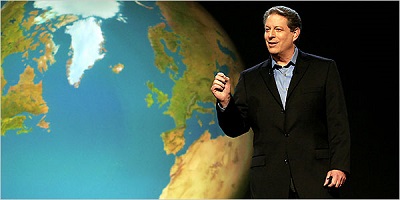An Inconvenient Truth is a 2006 provocative documentary on global warming directed by Davis Guggenheim. The film, based on the multi-media presentation given by former American Vice-President Al Gore in over 1,000 cities around the world in recent years, presents a disturbing picture of the destruction that global warming is doing to the Earth and the horrific future that we are facing if it is not addressed. Since the film's release, An Inconvenient Truth has been credited for raising international public awareness of climate change and reenergizing the environmental movement. The documentary has also been included in science curricula in schools around the world, which has spurred some controversy.

Gore says, "I have been trying to tell this story for a long time and I feel as if I have failed to get the message across." He, as a long-time environmental activist, first became aware of evidence on global warming in the 1970s, and since leaving public office he has become a passionate advocate for large- and small-scale changes in our laws and lifestyles that could help alleviate this crisis. This documentary discusses the scientific facts behind global warming, explains how it has already begun to affect our environment, talks about the disastrous consequences if the world's governments and citizens do not act, and shares what each individual can do to help protect the Earth for this and future generations.
Gore cleverly takes some heavy scientific information and uses visual references, graphs, photos and demonstrations to effectively convey the impact that global warming is having on our lives. In the film's strongest moments, Gore deftly uses compelling factual evidence to shatter many of the myths and arguments that naysayers against global warming often fall back on when getting into a debate on the issue. At times, there is the odd tenuous link that Gore tries to associate specific natural disasters as a direct effect of global warming.
Several reviews criticized the film on scientific and political grounds. Journalist Ronald Bailey argued in the Libertarian Magazine that although Gore gets “the science” more right than wrong, he exaggerates the risks. Global warming skeptics were vocally critical of the film, such as MIT physicist Richard S. Lindzen, who wrote on 26 June 2006 in the Wall Street Journal that Gore was using a biased presentation to exploit the fears of the public for his own political gain.
The impact of An Inconvenient Truth is unprecedented. Since its release in 2006, the film has helped to galvanize governments, leaders, organizations and individuals worldwide to take action on global warming. More than a billion people are now aware of the issue and have been motivated to act.
The documentary was a critical and box-office success, winning two Academy Awards for Best Documentary Feature and Best Original Song. The film earned USD 49 million at the box office worldwide, becoming the seventh highest grossing documentary film to date in the United States.
References
www.darkhorizons.com
www.takepart.com
www.ecomall.com